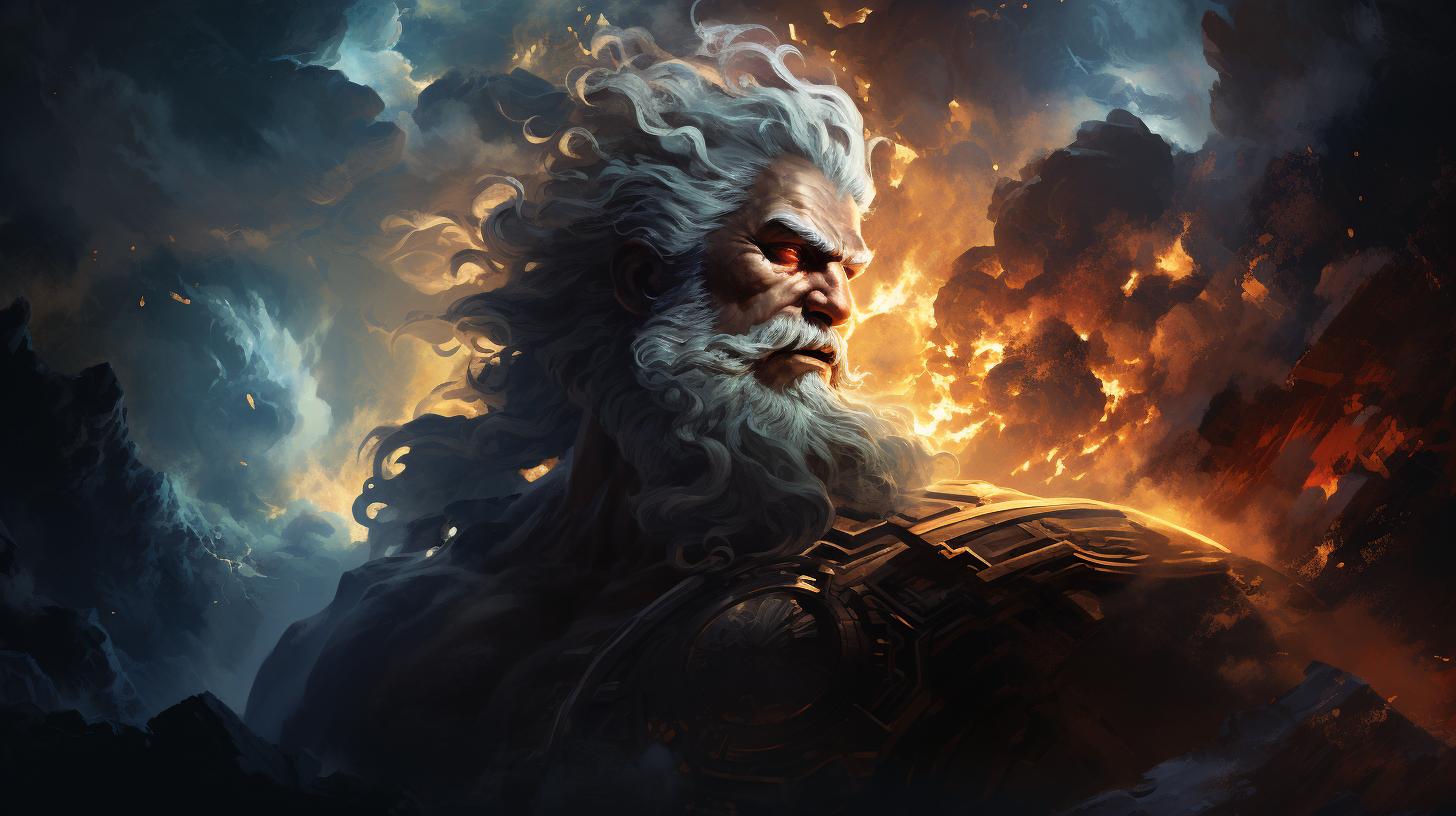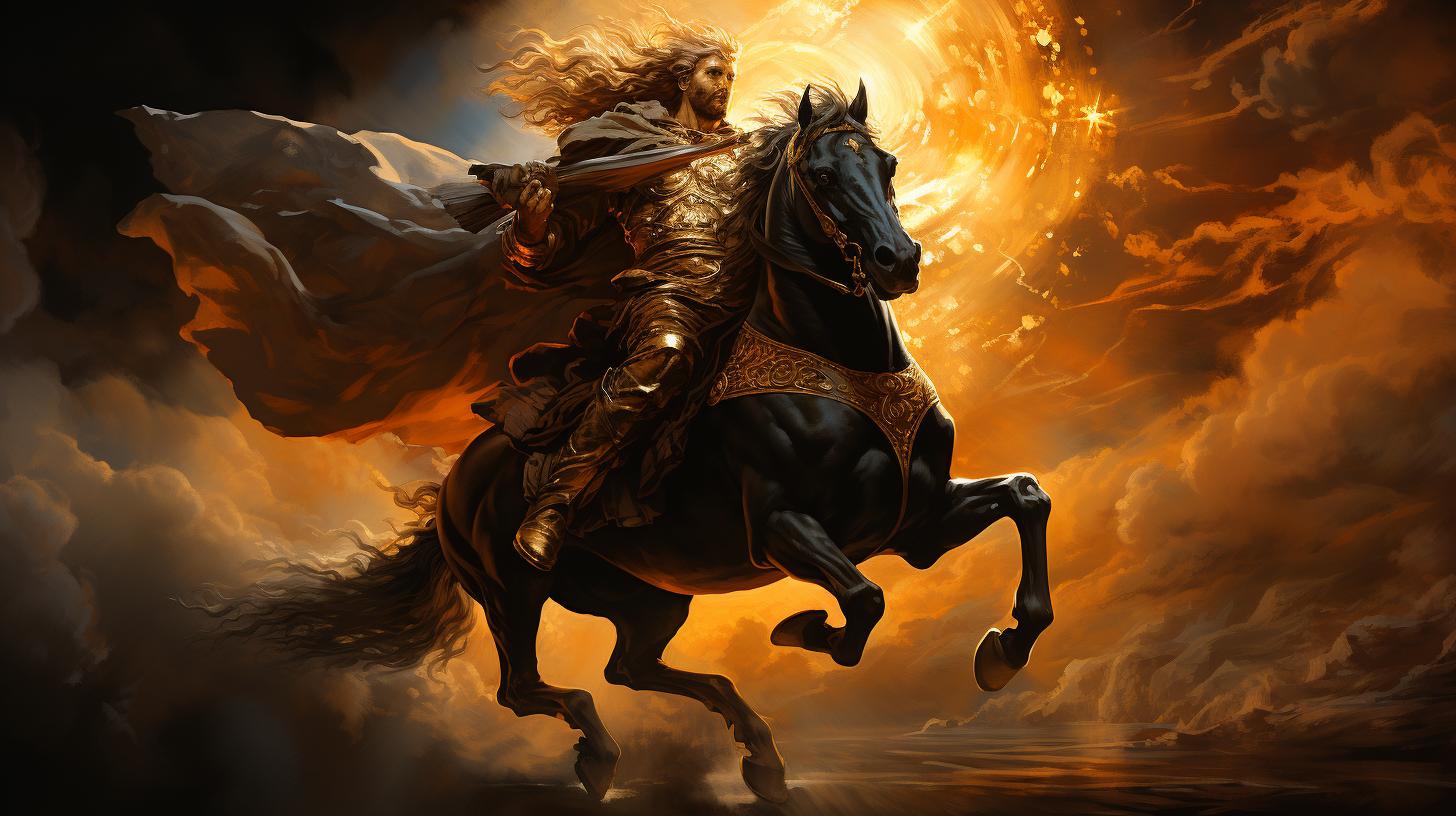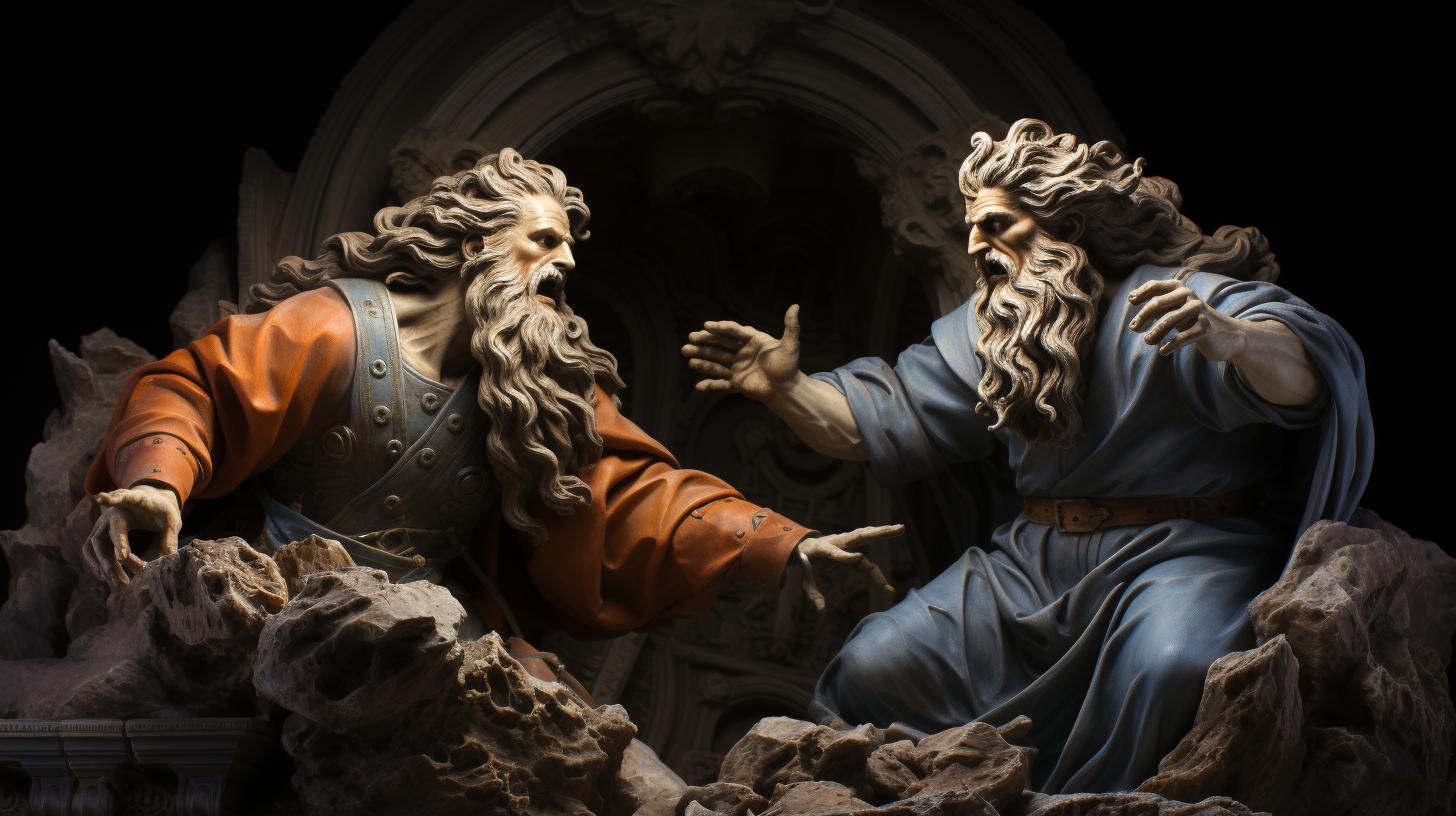What is Cronus the God of: Exploring the Greek Mythology and his Role in Harvest Celebrations

Cronus, a prominent figure in Greek mythology, was the leader of the Titans, descendants of the primordial gods Gaia and Uranus. He rose to power by overthrowing his father, Uranus, and ruled during the Golden Age.
Cronus was associated with harvest and honored through the Kronia festival in Athens. However, his fear of being overthrown led him to devour his own children. This sparked a war known as the Titanomachy, where Zeus and his siblings emerged victorious, becoming the new ruling gods of Mount Olympus.
Cronus was eventually imprisoned in Tartarus but later released under Zeus’ rule, becoming the king of the Blessed Isles.
The Origins and Lineage of Cronus
In Greek mythology, Cronus was a prominent figure and leader of the Titans, the first generation of divine beings. Understanding the origins and lineage of Cronus provides insight into his significance in Greek mythology and the events that shaped his rise to power.
The Primordial Gods: Gaia and Uranus
The story begins with the primordial gods, Gaia and Uranus. Gaia, the personification of Earth, and Uranus, the personification of the heavens, were the original divine beings who gave birth to the Titans.
Cronus, as the youngest of their children, played a pivotal role in the divine hierarchy.
Cronus’ Rise to Power: Overthrowing Uranus
Driven by ambition and envy of his father’s power, Cronus plotted to overthrow Uranus. With a cunning plan, Cronus castrated Uranus using a sharp sickle, thus dethroning him and becoming the ruler of the cosmos.
This act of patricide set in motion a chain of events that would shape the course of Greek mythology.
The act of overthrowing Uranus symbolized Cronus’ ascent to power and his determination to become the dominant force in the universe.
It marked the beginning of the reign of the Titans, with Cronus leading the way as their king.
As we delve deeper into the mythology surrounding Cronus, we gain a deeper understanding of his role in Greek society and his connection to different aspects of human existence.
Cronus: The God of Time and Harvest
Cronus, a prominent figure in Greek mythology, held significant roles as both the god of time and the god associated with harvest. His dominion over time stemmed from his position as the leader of the Titans and his participation in the overthrow of his father, Uranus. However, it is Cronus’ connection to harvest that brings forth a unique aspect of his divine nature.
The Kronia Festival: Honoring Cronus
During the festival of Kronia, celebrated in Athens, the Greeks paid homage to Cronus for his association with harvest and fruitful abundance. This festival acted as a tribute to the bountiful rewards that Cronus bestowed upon the agricultural realm.
It also served as a time for communities to come together and express gratitude for the prosperous yields obtained from the earth.
Cronus and his Association with Harvest
Cronus’ association with harvest extended beyond the festival. He was revered as the deity responsible for ensuring successful crop growth and a plentiful harvest season. Farmers and cultivators offered prayers and sacrifices to Cronus, seeking his favor and protection for their crops.
It was believed that by appeasing Cronus, one could ensure a fruitful and abundant harvest, providing sustenance for their communities.
- Cronus’ influence on fertility: As the god of harvest, Cronus was believed to enhance fertility in the land, leading to abundant crops and bountiful harvests. His divine presence and blessings were thought to increase the productivity of the agricultural fields, bringing prosperity to those who depended on the land for sustenance.
- Rituals and offerings: To honor Cronus and seek his favor, farmers and communities performed rituals and offered sacrifices, such as grains, fruits, and livestock. These acts were meant to demonstrate gratitude for past harvests and to secure future abundance.
- Protecting crops against adversity: As the overseer of harvest, Cronus was also believed to protect crops from natural disasters, pests, and other threats. People turned to him in times of need, hoping for his assistance in safeguarding their livelihoods and ensuring the ongoing prosperity of their agricultural endeavors.
Cronus, with his roles as the god of time and harvest, held immense significance in Greek mythology. Through the celebration of festivals like Kronia and the reverence shown through rituals and offerings, the ancient Greeks demonstrated their reliance on and gratitude for Cronus’ influence over the cycles of time and the abundance of the harvest.
Cronus’ Castration of Uranus and its Consequences
The act of Cronus castrating Uranus, his own father, had far-reaching consequences in Greek mythology. It was a pivotal event that gave birth to various entities, all stemming from the blood and severed testicles of Uranus. Let’s delve into the details of these significant consequences and explore the complex relationship between Cronus and his siblings.
The Birth of Various Entities from Uranus’ Blood and Testicles
From the blood that flowed from Uranus, a multitude of powerful beings emerged. One such group was the Gigantes, known for their immense strength and size. These formidable creatures would later play a role in the battles between gods and Titans.
Additionally, from Uranus’ severed testicles, Aphrodite, the goddess of love and beauty, was born. She emerged from the sea foam created by the interaction of the discarded testicles and the ocean.
Aphrodite’s birth represents the complexity and richness of Greek mythology’s intricate genealogies.
Relationship between Cronus and his Siblings
Cronus, as the youngest of the Titan generation, had several siblings who held significant positions in the Greek pantheon. His brothers were Oceanus, Hyperion, and Coeus, while his sisters included Theia, Rhea, and Mnemosyne. Each sibling possessed unique powers and attributes, contributing to the diverse tapestry of Greek mythology.
While Cronus ultimately rose to power and became the leader of the Titans, it’s important to note the intricate dynamics within the Titan family. The relationships between siblings, marked by alliances and rivalries, shaped the course of Greek mythology and impacted the power struggles that unfolded.
- The birth of various entities from Uranus’ blood, including the Gigantes
- The birth of Aphrodite from Uranus’ severed testicles
- The complex relationships between Cronus and his siblings
Cronus’ Fear of Being Overthrown and his Dark Actions
Cronus, in his quest to maintain his power and supremacy, harbored a deep fear of being overthrown by his own children.
This fear drove him to commit dark and violent acts that shaped the course of Greek mythology.
Devouring his Children: Rhea’s Struggle
Rhea, Cronus’ wife and sister, experienced the pain and heartbreak of watching her children being devoured by Cronus. Each time she gave birth, Cronus would immediately consume the newborn, driven by his paranoia and desire to maintain control.
Rhea’s struggle to protect her offspring from the clutches of Cronus led her to devise a plan to save her youngest child, Zeus. She sought refuge in the island of Crete, where Zeus was secretly raised in hiding, away from his father’s reach.
The Hidden Birth and Rise of Zeus
Zeus, the destined harbinger of Cronus’ downfall, grew up under the protection of nymphs and divine guardians in a secluded cave on Mount Ida. As he matured, Zeus became aware of his true identity and his great destiny to overthrow his father and restore order to the cosmos.
With a sense of divine purpose, Zeus embarked on a path to power. He sought the aid of his siblings, fellow victims of Cronus’ tyranny, and planned a rebellion against the Titan ruler.
The stage was set for the epic clash of the gods, known as the Titanomachy.
Through strategic alliances and a cunning plan, Zeus and his siblings would eventually succeed in overthrowing Cronus, bringing an end to his reign of fear and darkness.
Zeus emerged as the new ruler of Mount Olympus, ushering in a new era of gods.
The Titanomachy: Zeus vs. Cronus and the Titans
The Titanomachy was a monumental war that unfolded between Zeus, the powerful son of Cronus, and Cronus himself along with the other Titans. This conflict marked a pivotal point in Greek mythology, as it determined the shift in power from the older generation of gods to the new rulers of Mount Olympus.
The War for Supremacy on Mount Olympus
In his quest to overthrow his father, Cronus, Zeus rallied his siblings – Poseidon, Hades, Hera, Demeter, and Hestia – to challenge the Titans for control over the cosmos.
The Titanomachy was waged on the sacred battleground of Mount Olympus, where gods clashed with gods, and the heavens trembled under the weight of their struggle.
Zeus, armed with his mighty thunderbolt, led the charge against Cronus and his Titan allies.
It was a war fought not only with physical strength, but also with cunning strategies and divine powers. The conflict raged on for years, with both sides unleashing devastating blows and unleashing their mastery over the elements.
Zeus’ Victory and the Power Shift
Despite the formidable strength of the Titans, Zeus proved to be an indomitable force. With his unmatched power and the support of his siblings, he ultimately emerged victorious in the Titanomachy.
The defeat of Cronus and the Titans marked a significant shift in power as Zeus and his siblings ascended to become the new ruling gods of Mount Olympus.
This victory established Zeus as the supreme deity, presiding over the realms of sky, thunder, and justice.
The reign of Cronus and the Titans came to an end, and a new era dawned under the rule of Zeus and the Olympian gods. Their dominion extended over all aspects of life, from the heavens and the earth to the depths of the underworld.
In conclusion, the Titanomachy was a pivotal event in Greek mythology, symbolizing the transition of power from the Titans to the Olympians. Zeus’ triumph over Cronus and the Titans solidified his position as the king of the gods, ushering in a new era for the divine pantheon.
(Note: This text is a representation of the requested content as HTML, formatted with the appropriate heading tags and paragraph tags.)
Cronus’ Imprisonment and Later Fate
Cronus, after his defeat in the Titanomachy, faced the consequences of his actions. He was imprisoned in Tartarus, a dark and gloomy abyss located deep within the Underworld. In this desolate realm, Cronus suffered for his tyrannical rule and his devouring of his own children.
Imprisonment in Tartarus
Tartarus, known as the primeval prison of the gods, was the perfect place to hold Cronus captive. Surrounded by the most sinister creatures and fierce monsters, he experienced eternal torment and isolation.
Bound by unbreakable chains, Cronus was left to reflect upon his cruel deeds and the consequences they brought upon him.
The Release and New Role of Cronus under Zeus’ Rule
Despite his imprisonment, Cronus’ fate took an unexpected turn when Zeus, his own son, decided to free him.
Zeus believed in the power of redemption and wanted to give Cronus a chance to change for the better. Released from Tartarus, Cronus was granted a new role as the king of the Blessed Isles.
Under Zeus’ rule and guidance, Cronus found solace and a newfound purpose. The Blessed Isles, a serene and idyllic place reserved for virtuous souls, became his domain. Here, Cronus was tasked with maintaining harmony and order among the spirits dwelling in this peaceful realm.
As the king of the Blessed Isles, Cronus embraced his role with humility and sought to make amends for his past transgressions. He became a symbol of redemption and transformation, showing that even the darkest past can be overcome.
In conclusion, Cronus’ imprisonment in Tartarus served as a punishment for his actions, but he was given the opportunity to repent and find redemption under Zeus’ rule. His new role as the king of the Blessed Isles allowed him to embrace his personal growth and serve as an example of the power of change.
.




















